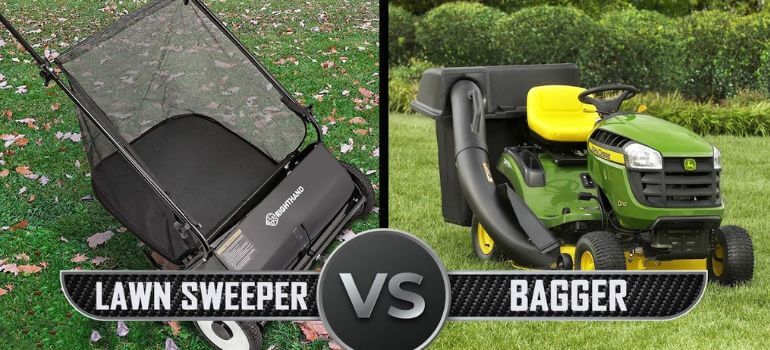If you’re a homeowner or a gardening enthusiast, you understand the importance of keeping your lawn clean and free from debris. Two common tools for achieving this are lawn sweepers and baggers. In this article, we’ll explore the differences between these two lawn maintenance solutions and help you decide which one is the right choice for your lawn care needs.
What is a Lawn Sweeper?
A lawn sweeper is a manual or tow-behind machine designed to collect leaves, grass clippings, twigs, and other debris from your lawn’s surface. It operates by using rotating brushes to gather the debris into a collection hopper, which can then be emptied into a compost pile or yard waste bag. Lawn sweepers are known for their efficiency in covering larger areas quickly.
What is a Bagger?
On the other hand, a bagger, often attached to a lawnmower, is a device that collects grass clippings as you mow your lawn. These clippings are then deposited into a bag or container, making disposal easier. Baggers are primarily designed for grass clippings, but some models can also handle leaves and light debris.
Advantages of Using a Lawn Sweeper
Lawn sweepers offer several advantages for maintaining a pristine lawn:
- Efficiency: They cover a wide area quickly, making them suitable for larger lawns.
- Easy Disposal: Debris is collected in a hopper, which can be conveniently emptied.
- Gentle on Grass: Lawn sweepers are less likely to damage your grass compared to heavy lawnmower baggers.
- Versatility: They can pick up leaves and other debris, not just grass clippings.

Advantages of Using a Bagger
Here are some benefits of using a bagger for lawn maintenance:
- Seamless Integration: Baggers are often integrated with lawnmowers, simplifying the mowing and collection process.
- Grass Recycling: Grass clippings collected by baggers can be used as mulch or for composting.
- Suitable for Smaller Lawns: Baggers are ideal for smaller lawns where the efficiency of a lawn sweeper might not be necessary.
Disadvantages of Using a Lawn Sweeper
While lawn sweepers are a valuable tool, they have their limitations:
- Initial Cost: Lawn sweepers can be more expensive to purchase.
- Additional Equipment: They may require a tow vehicle if you choose a tow-behind model.
- Not Suitable for Wet Debris: Lawn sweepers are less effective when the debris is wet.
Disadvantages of Using a Bagger
Baggers also come with their set of drawbacks:
- Limited Debris Types: They are primarily designed for grass clippings and may struggle with leaves or larger debris.
- Emptying Frequency: Smaller bags mean more frequent stops to empty them during mowing.
Which One is Better for Your Lawn?
The choice between a lawn sweeper and a bagger depends on your specific lawn care needs. Consider the following factors:
Factors to Consider When Choosing Between a Lawn Sweeper and a Bagger
- Lawn Size: Larger lawns benefit from the efficiency of a lawn sweeper, while baggers are suitable for smaller lawns.
- Debris Type: If you primarily deal with grass clippings, a bagger may suffice. For leaves and twigs, a lawn sweeper is more effective.
- Budget: Consider your initial investment and ongoing maintenance costs.
- Equipment Compatibility: Check if your lawnmower is compatible with a bagger attachment.
- Storage Space: Lawn sweepers can be bulkier and may require more storage space.
Maintenance and Cleaning
Both lawn sweepers and baggers require regular maintenance. Cleaning the collection hoppers or bags, inspecting for wear and tear, and greasing moving parts are essential for their longevity.
Cost Comparison
In terms of cost, baggers are often more budget-friendly, but long-term costs may vary based on the frequency of use and maintenance needs. Lawn sweepers, though pricier initially, offer a more versatile solution for different debris types.
Environmental Impact
If you’re eco-conscious, consider the environmental impact. Lawn sweepers can be seen as more sustainable since they encourage composting and recycling of yard waste. Baggers may contribute to waste generation but can be eco-friendly if you use the collected grass clippings for mulch or compost.
User Experience and Convenience
The user experience can also play a significant role in your decision. Some people prefer the ease of using a bagger attached to their lawnmower, while others appreciate the efficiency of a dedicated lawn sweeper.
Conclusion
In the battle of lawn sweeper vs. bagger, there’s no one-size-fits-all answer. Your choice should depend on the unique characteristics of your lawn and your personal preferences. Remember to consider factors like lawn size, debris type, budget, equipment compatibility, and environmental impact. Both tools have their strengths, and the decision ultimately comes down to what works best for you.
FAQs
1. Can I use a bagger and a lawn sweeper together?
- Yes, some users combine both tools for comprehensive lawn maintenance.
2. How often should I clean the collection hopper or bag?
- Regular cleaning after use is recommended to prevent clogs and maintain functionality.
3. Are there electric or gas-powered lawn sweepers?
- Yes, there are powered lawn sweepers available, but they are less common.
4. Can I use bagged grass clippings as mulch?
- Yes, bagged grass clippings can be used as mulch to enrich your garden soil.
5. Do baggers work well for picking up leaves in the fall?
- Baggers may struggle with large volumes of leaves. In such cases, a lawn sweeper is more effective.
